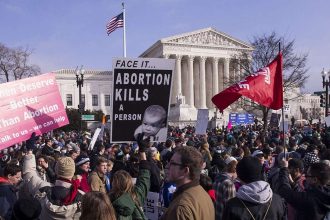The Supreme Court reported Friday morning that all nine justices are healthy and participated in their latest regular conference — though some did so by phone as a precaution against the spread of the novel coronavirus.
The coronavirus has been shown to be significantly more dangerous to older people, and six of the nine justices on the court are technically senior citizens. Only Justices Neil Gorsuch, Brett Kavanaugh and Elena Kagan are under 65 years old. Even President Obama appointee Justice Sonia Sotomayor, who was born in 1954, is 65 years old. Chief Justice John Roberts is also 65, whereas the oldest justice on the court, Ruth Bader Ginsburg, turned 87 this week.
The court said the justices are following public health guidelines, including avoiding shaking hands. This is a departure from the justices’ longtime tradition of shaking hands with every other justice before beginning a conference in an effort to maintain camaraderie.
Despite a postponement for oral arguments that were scheduled for late March and early April, the court will continue to release opinions on cases that it has already heard, including on Monday. It will not, however, release hard copies of its opinions at the actual courthouse. The opinions will be released digitally beginning at 10 a.m.
The cases affected by the postponement of oral arguments will include three cases involving access to President Trump’s financial documents for the House Ways and Means Committee and the Manhattan District Attorney’s Office, which were scheduled for argument on March 31.
Also on hold are a case regarding military prosecution of rape, a trademark case, a high-profile copyright case between tech giants Google and Oracle, a lawsuit by three Muslims who were put on the “No Fly List” after refusing to inform to the FBI, a case on the composition of Delaware’s state courts, a case on international funding to fight HIV, a Fourth Amendment case, a deportation case and a case on religiously-based discrimination.
It is unclear whether the Supreme Court will postpone further oral arguments as the coronavirus pandemic continues and also unclear what it will do about the cases it has already postponed. The court is not constitutionally required to hear in-person arguments on its cases, and theoretically could issue decisions based exclusively on written submissions.
IN OTHER NEWS:
- Federal appeals court blocks enforcement of Florida law restricting right of ex-felons to vote
- ‘Is the EC for your mother?’ – Citi FM CEO quizzes Jean Mensa
- Who are the longest serving Supreme Court justices?
- Justice S Muralidhar at farewell function
- Check out trump’s coronavirus test result
- Trump tangles with Cuomo over coronavirus: ‘Keep politics out of it’
- Lockdown in Ladakh as number od COVID-19 cases climb to 10














